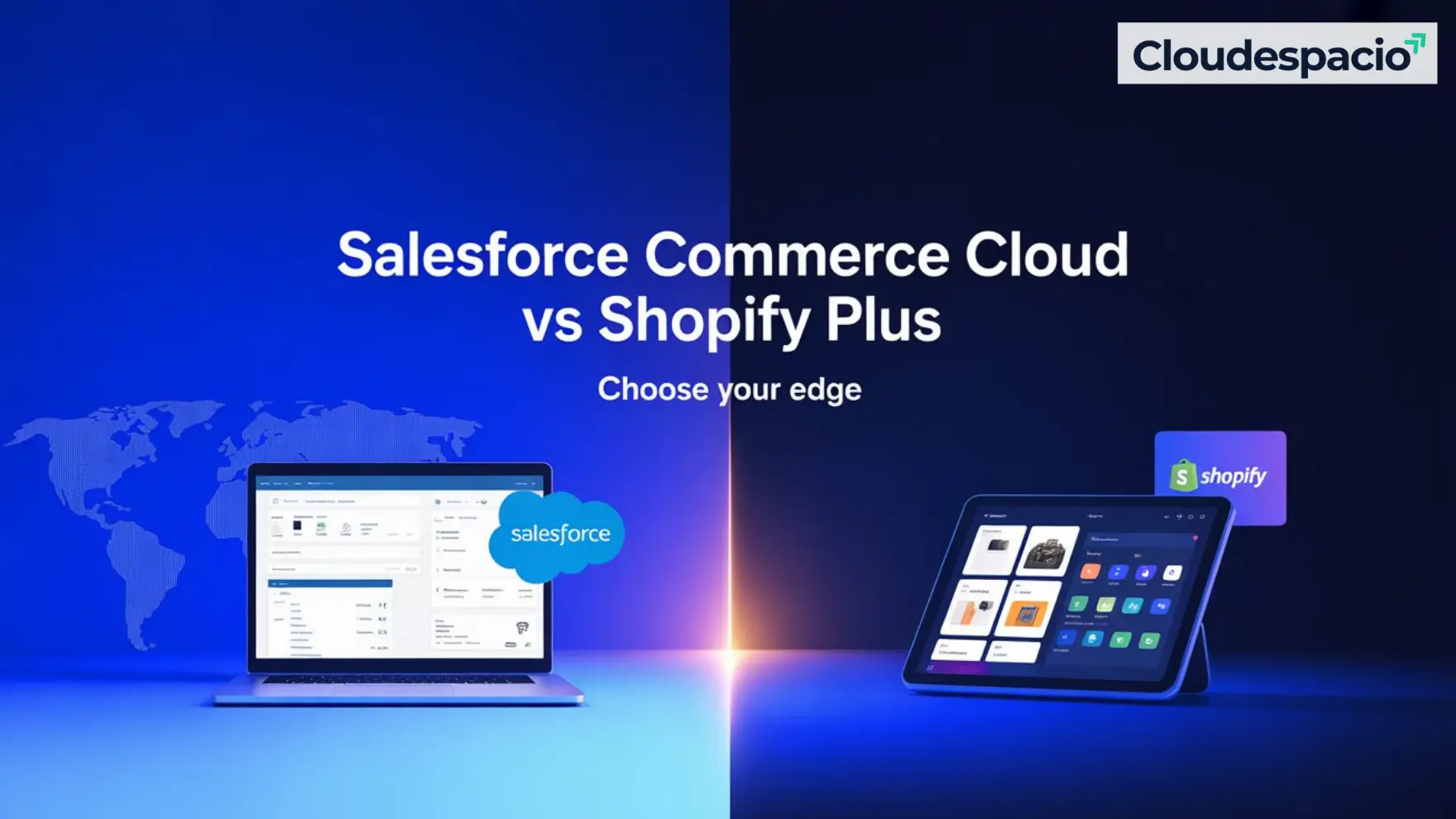


When building a business for the long haul, selecting an eCommerce platform goes beyond ticking boxes. The choice of a foundation must be in tune with your thoughts, works, and growth.
Both Salesforce Commerce Cloud (SFCC) and Shopify Plus provide businesses with a strong, scalable commerce experience, but they each represent a different approach to getting there.
One is designed to fit deeply into the fabric of your enterprise structure, while the other helps you move fast. We will help you determine which one best supports your strategy in this comparison. Lets do Salesforce Commerce Cloud vs Shopify Plus comparison.
Originally Demandware, SFCC has become Salesforce’s answer for enterprise commerce. It connects directly with Salesforce CRM, Marketing Cloud and Service Cloud to create an efficient centralized, data-driven architecture for B2C and B2B enterprise applications.
It’s ideal for businesses who trade globally, across regions, brands or product categories – and need deep personalization, order logic, and backend control.
Shopify Plus makes the power you need, with the simplicity of Shopify. It is on the cloud, optional for developers, and agile.
This is a great choice for businesses that love speed and flexibility, as well as plugging into apps in order to grow fast. This is ideal for direct-to-consumer sellers and experimenters who are not heavily invested in deep customizations.
With SFCC, you are working on an open framework. We can customize all of it – from how quickly your homepage loads to how orders are routed – based on your internal logic.
Shopify Plus is more of a guided playground. In hydrogen and oxygen, you can do a lot of customization especially for headless builds, but you are still constrained by platform.
SFCC comes integrated with Salesforce’s Einstein AI intelligence layer. It automatically powers product recommendations, search personalization, and dynamic merchandising.
Shopify Plus relies mainly on partner apps or custom AI integrations, as it is catching up. While Shopify Magic provides some handy tools, it is largely not at the scale of Einstein yet.
With SFCC, you can create a fully custom checkout experience, including checkout fields, logic, payment flows, and A/B-tested funnels.
With the addition of Shopify Functions, the checkout extensibility of Shopify Plus is quite powerful. However, it is still templated. The new Checkout Editor and Script tools are an interesting addition.
SFCC utilizes Salesforce Flow which helps various teams to automate everything from cart recovery to post purchase journeys across services.
Shopify Plus has Shopify Flow that helps with conditional logic. It can be used for tagging VIP customers and letting staff know when to restock. For complex backend operations, though, you may require apps or external automation tools.
SFCC enables businesses to set up multiple storefronts for international commerce with ease. You can easily assign different languages, currencies, tax rules, and pricing tiers to each storefront.
Shopify Plus does a good job of global selling. However, building a store with features such as regional content, tax/VAT automation, etc. may require the use of duplicated stores or third-party solutions.
Salesforce Commerce Cloud – A Strategic Investment.The price of SFCC varies with the GMV (gross merchandise volume). You pay a percentage, often tiered, and gain access to enterprise features. Most of the time, onboarding uses Salesforce implementation partners.
Cost areas:
If your business model is complex or high-ticket, then the long-run ROI will beat costs.
Shopify Plus starts at $2,000/month, and cost increases with your revenue tier. You receive top-notch assistance, checkout personalization, plus automated utilities.
Additional expenses:
While the entry price of Shopify Plus is more affordable, scaling may incur hidden costs.
Prefer low-infrastructure tools with app-based flexibility.
Have a strong D2C focus with clean catalogs.
Trying fast campaigns, MVPs, or viral growth loops.
In 2025 platform fit will be a strategy, not a trend.
In 2025, commerce is not about choosing the best platform. Your growth vision must match with the right architecture.
Salesforce Commerce Cloud provides the design and scale to fulfill your vision, whether that vision includes reaching globally, deep integrations, or data-driven workflows. If you want to build a cool and fast-moving brand, Shopify Plus gives you all tech tools so that you can test and launch & evolve easily.
The choice between McDonald’s and Burger King isn’t wrong; it just depends on your business. so here we did our best Salesforce Commerce Cloud vs Shopify Plus comparison.

Cloudespacio, headquartered in Singapore, is a prominent independent Salesforce and leading consulting firm, dedicated to prioritizing client satisfaction.
Copyright © 2025 All Rights Reserved. Designed by Navpatra.

If you have a project in mind, let’s talk!